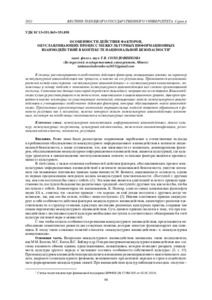Please use this identifier to cite or link to this item:
https://elib.psu.by/handle/123456789/27090| Title: | Особенности действия факторов, обуславливающих процесс межкультурных информационных взаимодействий в контексте национальной безопасности |
| Authors: | Солодовникова, Т. В. Saladounikava, T. |
| Other Titles: | THE SPECIFICS OF THE FACTORS THAT DETERMINE THE PROCESS OF INTERCULTURAL INFORMATION INTERACTIONS IN THE CONTEXT OF NATIONAL SECURITY |
| Issue Date: | 2021 |
| Publisher: | Полоцкий государственный университет |
| Citation: | Солодовникова, Т. В. Особенности действия факторов, обуславливающих процесс межкультурных информационных взаимодействий в контексте национальной безопасности / Т. В. Солодовникова // Вестник Полоцкого государственного университета. Серия A, Гуманитарные науки. - 2021. - № 2. - С. 66-71. |
| Abstract: | В статье рассматриваются особенности действия факторов, оказывающих влияние на характер межкультурного взаимодействия как процесса, а также на его результаты. Принимаются во внимание различия между категориями «межкультурное взаимодействие» и «межкультурная коммуникация», положенные в основу подхода к пониманию межкультурного взаимодействия как сложно организованной системы. Соотношение данных категорий определяет дальнейшее направление исследования. Взаимодействие культур рассматривается на этническом, национальном и цивилизационном уровнях. Автором приводятся также некоторые из существующих типологий, описывающие модели межкультурного взаимодействия и учитывающие особенности действия факторов, которые обуславливают такое взаимодействие. Присутствие в рассмотренных типологиях отрицательных моделей позволяет обратиться к феномену регуляции как к механизму, наличие которого делает межкультурное взаимодействие возможным, несмотря на неизбежные столкновения в межкультурных отношениях.= The article addresses the specifics of the action of factors that influence the nature of intercultural interaction as a process, as well as its results. The differences between the categories of “intercultural interaction” and “intercultural communication” are considered, which form the basis of the approach to understanding intercultural interaction as a complex system. The relation between these categories determines the further direction of the study. In the context of identification and systematization of the features of intercultural interaction, the interaction of cultures is considered at the ethnic, national, and civilizational levels. The author also provides some of the existing typologies that describe models of intercultural interaction and consider the particular effects of factors that determine such interaction. The presence of negative models in the typologies considered allows to address the phenomenon of regulation as a mechanism the presence of which makes intercultural interaction possible despite inevitable collisions in intercultural relations. |
| Keywords: | Государственный рубрикатор НТИ - ВИНИТИ::ОБЩЕСТВЕННЫЕ НАУКИ::Языкознание Межкультурная коммуникация Информационное взаимодействие Диалог культур Межкультурные стереотипы Культурная идентичность Этническая самоидентификация Региональная идентичность Типология Регуляция Intercultural communication Information interaction Dialogue of cultures Intercultural stereotypes Cultural identity Ethnic self-identification Regional identity Typology Regulation |
| URI: | https://elib.psu.by/handle/123456789/27090 |
| metadata.dc.rights: | open access |
| Appears in Collections: | 2021, № 2 |
Items in DSpace are protected by copyright, with all rights reserved, unless otherwise indicated.
